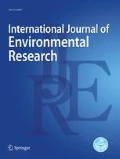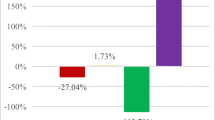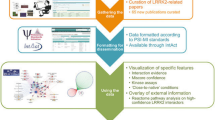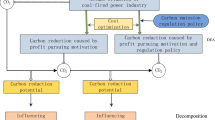Abstract
Over the past few decades, industrial development has caused a dramatic increment in greenhouse gas (GHG) emissions, as a leading cause of climate change. Modifying the industrial plants' environmental performance is the main pillar of improving efficiency that can reduce the waste of resources and make achieving lower-cost global emission reduction targets of the Kyoto protocol's clean development mechanism (CDM) possible. Considering the essentiality of knowledge-based research in increasing the awareness of policymakers by providing better access to accurate and reliable information, an analytical survey on efficiency in oil, gas, and petrochemical industries has been conducted by applying data envelopment analysis (DEA). For this purpose, comprehensive evaluations were elaborated on monthly data for Zagros Petrochemical Company (ZPC), from 2011 to 2017, as a case study. The CO2 equivalent emissions of fuel combustion in the petrochemical plant's furnaces were calculated according to standard guidelines for calculation and reporting GHG to be used for environmental efficiency estimations. The data envelopment analysis program (DEAP) was applied to estimate efficiencies through the data envelopment analysis-materials balance principle (DEA-MBP) approach, which is a robust approach employed in this study to provide practical solutions to both economic and environmental concerns. Since DEA-MBP is based on the materials balance principle and incorporates by-products, it can reliably explain the best relationship between product quantities, carbon emissions, and external costs. The outcomes revealed that the lower heating value of natural gas and CO2 emission factor and CO2 equivalent emissions were 32.87 × 10–3 GJ/Sm3, 55.73 × 10–3 ton/GJ, and 2,376,449 tons, respectively. DEAP analysis also exhibited the technical, environmental, and environmental allocative efficiency scores as 0.976, 0.861, and 0.881, respectively, and estimated distances to efficiency frontiers were 0.024, 0.139, and 0.119, respectively. Ultimately, the carbon prices were found to be about US$83,175,715 and US$71,531,110 under two scenarios (A and B).
Article Highlights
-
Environmental efficiency improvement is the main pillar that leads to achieving lower-cost global emission reduction targets.
-
A significant drop of greenhouse gas emissions can be anticipated as a consequence of efficiency improvement.
-
Improving the environmental efficiency reduces the carbon price.
-
Data Envelopment Analysis specifies in what possible ways corporations can allocate the limited resources to improve production, successfully.


Similar content being viewed by others
Notes
Charnes, Cooper, and Rhodes -1978.
Banker, Charnes, Cooper -1984.
Electricity, received steam in the startup phase, desalinated water, demineralized water, seawater, nitrogen, oxygen, instrument air, service air, feed gas and fuel.
References
Aryanasl A, Ghodousi J, Arjmandi R, Mansouri N (2017) Components of sustainability considerations in the management of petrochemical industries. Environ Monit Assess 189:274. https://doi.org/10.1007/s10661-017-5962-y
Banker RD, Charnes A, Cooper WW (1984) Some models for estimating technical and scale inefficiencies in data envelopment analysis. Manag Sci 30:1078–1092. https://doi.org/10.1287/mnsc.30.9.1078
Barnum DT, Gleason JM (2008a) Measuring the efficiency of electricity generating plants with fixed proportion technology indicators. UIC College of Business Administration Research Paper 8–12. Available at DIALOG: https://ssrn.com/abstract=1319761 or http://dx.doi.org/https://doi.org/10.2139/ssrn.1319761.
Barnum DT, Gleason JM (2008b) Bias and precision in the DEA two-stage method. Appl Econ 40:2305–2311. https://doi.org/10.1080/00036840600949470
Barros CP (2008) Efficiency analysis of hydroelectric generating plants: a case study for Portugal. Energy Econ 30:59–75. https://doi.org/10.1016/j.eneco.2006.10.008
Bormann FH, Likens GE (1995) Biogeochemistry of a forested ecosystem. Springer-Verlag, Berlin, p 162
Charnes A, Cooper WW, Rhodes E (1978) Measuring the efficiency of decision-making units. Eur J Oper Res 2:429–444
Chen Y, Han Y, Zhu Q (2017) Energy and environmental efficiency evaluation based on a novel data envelopment analysis: an application in petrochemical industries. Appl Therm Eng 119:156–164. https://doi.org/10.1016/j.applthermaleng.2017.03.051
Coelli TJ (1996) A guide to DEAP version 2.1: a data envelopment analysis (computer) program. Centre for efficiency and productivity analysis (CEPA), Department of econometrics, Working Paper 96/08, University of New England, Armidale, pp 1–50
Coelli TJ, Lauwers L, Van Huylenbroeck G (2005) Formulation of technical, economic and environmental efficiency measures that are consistent with the materials balance condition. CEPA Working Papers Series WP062005, School of Economics, University of Queensland, Australia. https://economics.uq.edu.au/files/5310/WP062005.pdf
Coelli T, Lauwers L, Van Huylenbroeck G (2007) Environmental efficiency measurement and the materials balance condition. J Prod Anal 28:3–12. https://doi.org/10.1007/s11123-007-0052-8
Collins C, Oshodi O (2010) Improper Abandonment of Oil. Nigerians in America.
Emami Meibodi A, Karimian Z, Rahmani Sefati MH (2011) Measuring technical efficiency and productivity of Iranian petrochemical plants over the period 2002 to 2008. J Energy Econ Rev 8(29):61–81
Färe R, Grosskopf S, Lovell CK, Pasurka C (1989) Multilateral productivity comparisons when some outputs are undesirable: a nonparametric approach. Rev Econ Stat. https://doi.org/10.2307/1928055
Farrell MJ (1957) The measurement of productive efficiency. J R Stat Soc Ser A (General) 120(3):253–290
Geng Z, Dong J, Han Y, Zhu Q (2017) Energy and environment efficiency analysis based on an improved environment DEA cross-model: case study of complex chemical processes. Appl Energy 205:465–476. https://doi.org/10.1016/j.apenergy.2017.07.132
Geng Z, Zeng R, Han Y, Zhong Y, Fu H (2019) Energy efficiency evaluation and energy saving based on DEA integrated affinity propagation clustering: a case study of complex petrochemical industries. Energy 179:863–875. https://doi.org/10.1016/j.energy.2019.05.042
Gobo AE, Richard G, Ubong IU (2009) Health impact of gas flares on Igwuruta/Umuechem communities in Rivers State. J Appl Sci Environ Manage 13(3):27–33. https://doi.org/10.4314/jasem.v13i3.55348
Ismail O, Umukoro G (2012) Global impact of gas flaring. Energy Power Eng 4:290–302. https://doi.org/10.4236/epe.2012.44039
Méndez GV, Peiró LT (2014) Materials balance models. In: Fischer M, Nijkamp P (eds) Handbook of Regional Science. pp 1009–1028. https://doi.org/https://doi.org/10.1007/978-3-642-23430-9_60.
Ministry of Petroleum, Office of Health, Safety, Environment and Passive Defense (2018) Guidelines for calculating and reporting greenhouse gas emissions. MOP-HSED-GL-307(1), pp 26–30
Nasiritousi N (2017) Fossil fuel emitters and climate change: unpacking the governance activities of large oil and gas companies. Environ Politics 26:621–647. https://doi.org/10.1080/09644016.2017.1320832
National petrochemical company of Iran (2014) Iran's petrochemical industry report (annual report), International Affairs Department, pp 127–128
Organization for Economic Co-operation and Development (2013) Taxing energy use: a graphical analysis. OECD, Paris
Osman I, Anouze AL, Emrouznejad A (2014) Handbook of research on strategic performance management and measurement using data envelopment analysis. IGI Global. https://doi.org/10.4018/978-1-4666-4474-8
Rogge N (2012) Undesirable specialization in the construction of composite policy indicators: the Environmental Performance Index. Ecol Indic 23:143–154. https://doi.org/10.1016/j.ecolind.2012.03.020
See KF, Coelli T (2012) An analysis of factors that influence the technical efficiency of Malaysian thermal power plants. Energy Econ 34:677–685. https://doi.org/10.1016/j.eneco.2011.09.005
Shadman F (2012) Environmental and cost efficiency of steam-powered electricity generation in Iran. Universiti Putra Malaysia (Ph.D. dissertation). Available via DIALOG. https://psasir.upm.edu.my/id/eprint/67273/Environmental and cost efficiency of steam-powered electricity generation in Iran.
Shadman F, Abdulrahim Kh (2011) Materials balance principle and data envelopment analysis in evaluating environmental and cost efficiency in electricity generation. 2nd international conference on environmental science and technology, IPCBEE, vol 6. IACSIT Press, Singapore
Shadman F, Abdulrahim Kh (2016) Joint environmental and technical efficiency of steam power plants: a case study of Iran. J Air Pollut Health 2(1):33–46
Shah JV (2014) The eight factors driving global industrial efficiency, Institute for Industrial Productivity. https://www.greentechmedia.com/articles/read/bending-the-curve-on-industrial-energy-efficiencyAccessed 20 Aug 2020
Shavvalpour S, Khanjarpanah H, Zamani F, Jabbarzadeh A (2017) Petrochemical products market and stock market returns: empirical evidence from Tehran Stock Exchange. Iran Econ Rev 21(2):383–403
United Nations Framework Convention on Climate Change (2018) An informal document containing the draft elements of guidance on cooperative approaches referred to in Article 6, Paragraph 2, of the Paris Agreement. UNFCCC. Available via DIALOG. https://unfccc.int/resource/docs/2018/sbsta/eng/sbsta48.informal.2.pdf
Wang K, Wei Y-M, Huang Z (2018) Environmental efficiency and abatement efficiency measurements of China's thermal power industry: a data envelopment analysis based materials balance approach. Eur J Oper Res 269:35–50. https://doi.org/10.1016/j.ejor.2017.04.053
Welch E, Barnum D (2009) Joint environmental and cost-efficiency analysis of electricity generation. Ecol Econ 68:2336–2343. https://doi.org/10.1016/j.ecolecon.2009.03.004
World Bank Group (2001) Regulation of associated gas flaring and venting. A global overview and lessons from international experience. World Development Report, Washington, pp 42–45
World Bank Group (2018) Report of state and trends of carbon pricing. Washington 12, 24, 57–58
Acknowledgements
The authors would like to thank the Zagros Petrochemical Company (ZPC) professional team for providing the data and valuable consultants to this research.
Author information
Authors and Affiliations
Corresponding author
Ethics declarations
Conflict of interest
The authors state that there is no conflict of interest.
Rights and permissions
About this article
Cite this article
Keivani, E., Abbaspour, M., Abedi, Z. et al. Promotion of Low-Carbon Economy through Efficiency Analysis: A Case Study of a Petrochemical Plant. Int J Environ Res 15, 45–55 (2021). https://doi.org/10.1007/s41742-020-00282-1
Received:
Revised:
Accepted:
Published:
Issue Date:
DOI: https://doi.org/10.1007/s41742-020-00282-1




